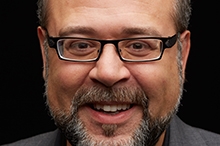Data liberación: the Path to Precision Medicine

On January 30, 2015, I watched with excitement the live video stream in which President Barack Obama announced a $215 million investment to expand our country’s Precision Medicine Initiative. The National Institutes of Health (NIH) defines precision medicine as an “approach for disease treatment and prevention that takes into account individual variability in genes, environment, and lifestyle for each person.”
As a person living with familial hypertrophic cardiomyopathy (HCM), a genetic cardiovascular disease that puts me at risk for sudden cardiac death, the president’s announcement was welcome news. HCM affects an estimated one in 500 people and is the most common genetic heart condition in the United States. It is also the leading cause of sudden cardiac death in people under the age of 35.
New precision medicine approaches to treat HCM are already underway. These unprecedented treatments hold the promise of stopping—and potentially even reversing—the course of the disease. This gives me great hope for the future.
But if we hope to usher in a new era of personalized medicine, we must first liberate our health data. This has been the focus of my advocacy.
Ever since receiving an implantable cardioverter-defibrillator (ICD), a small electronic device designed to deliver a shock to the heart in the event of a deadly arrhythmia, I have sought to liberate the data collected by my implant. As helpful as it is to a physician, the data collected by the ICD is mostly useful to the patient living with the condition, if he hopes to engage in his care and take responsibility for his health.
However, under the current care model, data from implanted cardiac devices (such as pacemakers and ICDs) is inaccessible to patients.
The Health Insurance Portability and Accountability Act (HIPAA) gives patients the right to access their medical records. But while patients can obtain copies of the reports generated from the ICD, the electronic data remains siloed away and out of their reach. This forces patients to take a passive role in their care and discourages engagement. We must reconsider this and other outdated practices that are obstacles to precision medicine.
During President Obama’s announcement, he also stated that in order for precision medicine to realize its full potential, we must create tools that give patients the ability to get involved. “We want every American, ultimately, to be able to securely access and analyze their own health data so that they can make the best decisions for themselves and for their families,” said President Obama. It was music to my ears.
I took the President’s words as a call to free our health data so we can use it to improve our health and that of our fellow Americans—“data liberacíon” as Todd Park, former Chief Technology Officer of the United States, would say.
As patients, we must secure access to our health data, have the opportunity to learn from it, and the freedom to share it with whomever we wish, including donating it to research for the public good. Freeing the data will also enable patient activation and promote individual responsibility, and it will clear our path to precision medicine. As Americans, we deserve this.
Hugo Campos is a data liberation advocate and leader in the e-patient movement.
White House Blogs
- The White House Blog
- Middle Class Task Force
- Council of Economic Advisers
- Council on Environmental Quality
- Council on Women and Girls
- Office of Intergovernmental Affairs
- Office of Management and Budget
- Office of Public Engagement
- Office of Science & Tech Policy
- Office of Urban Affairs
- Open Government
- Faith and Neighborhood Partnerships
- Social Innovation and Civic Participation
- US Trade Representative
- Office National Drug Control Policy
categories
- AIDS Policy
- Alaska
- Blueprint for an America Built to Last
- Budget
- Civil Rights
- Defense
- Disabilities
- Economy
- Education
- Energy and Environment
- Equal Pay
- Ethics
- Faith Based
- Fiscal Responsibility
- Foreign Policy
- Grab Bag
- Health Care
- Homeland Security
- Immigration
- Innovation Fellows
- Inside the White House
- Middle Class Security
- Open Government
- Poverty
- Rural
- Seniors and Social Security
- Service
- Social Innovation
- State of the Union
- Taxes
- Technology
- Urban Policy
- Veterans
- Violence Prevention
- White House Internships
- Women
- Working Families
- Additional Issues

